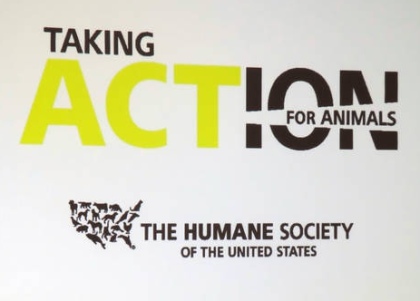‘Never give up’: Tips for animal advocates working with law enforcement

AIReporter Catherine Cowan fills us on from the Taking Action for Animals conference in D.C. this weekend / Photo: Catherine Cowan and Paul Becker
Fresh AIR from D.C.: AIReporter Catherine Cowan is in Washington this weekend to fill us in on Taking Action for Animals, a conference organized by The Humane Society of the United States.
By Catherine Cowan
“Be respectful. Know the law. Never give up.”
This was some of the advice dispensed to animal advocates during a half-day session on “How to Work With Local Law Enforcement and Animal Control to Address Animal Cruelty,” presented on the first day of Taking Action for Animals, a conference in Washington, D.C. organized by The Humane Society of the United States (HSUS).
One of the premier national conferences for animal advocates across the United States, TAFA provides an opportunity for both seasoned activists and new advocates to come together and learn some of the latest ideas and tactics to make the world better for both animals and people, as described by HSUS.
Day 1 of the conference saw a series of half-day workshops on specific issues such as protecting horses, saving dogs, and campaigning for farm animals. Kicking off the series was a panel on working with law enforcement.
Interest in animal protection at an all-time high
Now is a time of great change in how animal welfare issues are perceived, said panelist Kimberly Alboum, HSUS state director for North Carolina. Interest in animal protection is at an all time high. But now that the humane movement has the attention of the media and public, it may need to present itself differently.
“At one time we had to be the loudest in the room to be heard,” Alboum said. “Now we have to be reasonable. We must treat people with respect. We can’t ask for good treatment of animals if we don’t respect people. We will remain the crazy animal people if we scream and holler.”
Advocates need to understand what the law can and can’t do so they don’t ask law enforcement for things it can’t deliver, Alboum said. If law enforcement isn’t addressing a situation, it may be because the law doesn’t give them the authority to act. Rather than attacking law enforcement, a more constructive approach would be to meet with elected and appointed leaders to change the laws.
Using social media
Social media, especially Facebook, “has been both phenomenal for the animal welfare movement, and horrible,” Alboum said. For example, if a shelter is in need of supplies, it can put out a call on Facebook, and mountains of blankets and food will be delivered.
On the flip side, misinformation can spread in a flash, undermining credibility and damaging relationships. “As a rule, please confirm any information before forwarding or posting it,” Alboum said. “Once misinformation about animal control, law enforcement or a shelter is out there, you can’t take thousands of Facebook posts back.”
Catherine Cowan has 18 years of experience in writing, editing, and communications. Starting as a reporter at a small-town newspaper in Indiana, she worked her way up to nation and world news editor at a top newspaper in Kentucky before moving into an editing role at a magazine on issues facing state governments. She has also done communications for a non-profit health care company and a state university research center. She is owned by four rescued and adopted cats and has a long-standing interest in animal issues and human-animal interactions.
Want more fresh AIR from the TAFA conference in D.C.?
Articles by AIReporter Catherine Cowan:
‘Not everyone is a villain’ in animal crimes: Tips on working with law enforcement
And coming up soon…
- Who’s in control? Tips for animal advocates working with law enforcement
- Top 13 tips for animal advocates working with law enforcement
Please respect copyright law. Sharing AIR links really helps! But copying more than a couple of paragraphs of content without permission is a no-no. If you’d like to use one of AIR’s articles or one of our photographs, kindly contact us at [airinfo AT yahoo DOT com].
Copyright © 2012 Animal Issues Reporter and AnimalIssuesReporter.org.
All rights reserved.
Leave a Reply